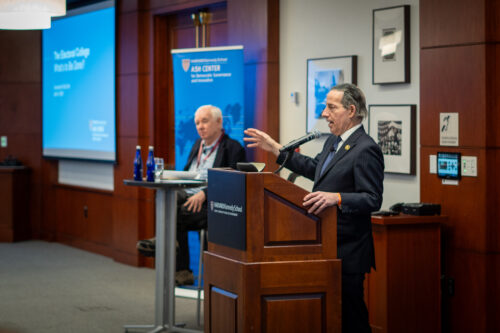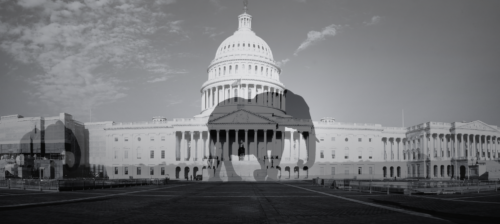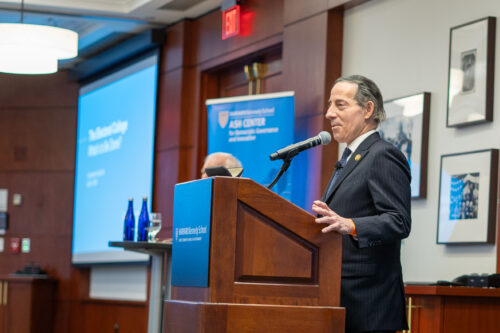
Feature
Moving beyond the Electoral College
At an Ash Center symposium on Electoral College reform, Congressman Jamie Raskin makes the case that the US should finally move to a direct popular vote for selecting presidential winners.
Media Release
In a recently published discussion paper from the Ash Center for Democratic Governance and Innovation at Harvard Kennedy School, Stephen Goldsmith and Ryan Streeter propose a new ideological framework for the conservative movement in the United States centered around aspiration, opportunity, and personal responsibility to help drive upward mobility.
Cambridge, MA – In a recently published discussion paper from the Ash Center for Democratic Governance and Innovation at Harvard Kennedy School, Stephen Goldsmith and Ryan Streeter propose a new ideological framework for the conservative movement in the United States centered around aspiration, opportunity, and personal responsibility to help drive upward mobility.
Goldsmith, the Derek Bok Professor of the Practice of Urban Policy at HKS, was the George W. Bush campaign’s chief domestic policy advisor in 2000. Streeter, the executive director of research and publications for the Civitas Institute at the University of Texas at Austin, previously served as a special assistant for domestic policy to President George W. Bush at the White House.
Goldsmith and Streeter’s An Aspirational Path for American Conservatism lays the groundwork for what the pair term “aspirational conservatism,” rejecting what they argue are the false choices of culture-war populism and nationalism. Yet, the paper also warns against a return to what Goldsmith and Streeter dismiss as “conservatism-light,” with its anti-government as opposed to reform minded focus.
Rather, the paper call for elevating what they identify as a long running strain of conservative thought present in American politics, which has consistently argued for the central role of aspiration, opportunity, and personal responsibility in upward mobility. “Its followers display a strong preference for locally devolved problem solving, a safety net that incentivizes skill development and employment, and a commitment to removing barriers that disadvantage those with little financial and social capital,” Goldsmith and Streeter write.
The authors make the case that an overemphasis on blunt tax cuts and unfocused regulatory changes has done little to improve the individual happiness of most Americans. They lay out a vision of aspirational conservativism that believes upward mobility stems not only from a dynamic economy but also from educational environments that drive success, strong families and neighborhoods, workplaces that reward conscientiousness and achievement, and values-shaping institutions such as congregations and private charities.
“We argue here for conservative governance that is respectful of its citizens, supportive of America’s underlying values, mindful that significant challenges remain, and aware that good politics and good policy require an effective government that helps individuals achieve their aspirations.”
The Roy and Lila Ash Center for Democratic Governance and Innovation, a research center at Harvard Kennedy School is Harvard’s hub for the study, discussion, and analysis of democracy. The Ash Center’s mission is to develop ideas and foster practices for equal and inclusive, multi-racial and multi-ethnic democracy and self-government.
Feature
At an Ash Center symposium on Electoral College reform, Congressman Jamie Raskin makes the case that the US should finally move to a direct popular vote for selecting presidential winners.
Feature
During an opening panel at an Ash Center symposium on the future of the Electoral College, scholars examined the history behind how the US adopted its peculiar centuries-old system of choosing presidential election winners – and what should be done to reform or even abolish the practice today.
Video
Harvard-ID holders were invited to join the Ash Center for Democratic Governance and Innovation and the Institute of Politics for a conversation with Congressman Jamie Raskin (MD-08) about the future of the Electoral College.
Feature
At an Ash Center symposium on Electoral College reform, Congressman Jamie Raskin makes the case that the US should finally move to a direct popular vote for selecting presidential winners.
Feature
During an opening panel at an Ash Center symposium on the future of the Electoral College, scholars examined the history behind how the US adopted its peculiar centuries-old system of choosing presidential election winners – and what should be done to reform or even abolish the practice today.
Video
Harvard-ID holders were invited to join the Ash Center for Democratic Governance and Innovation and the Institute of Politics for a conversation with Congressman Jamie Raskin (MD-08) about the future of the Electoral College.


